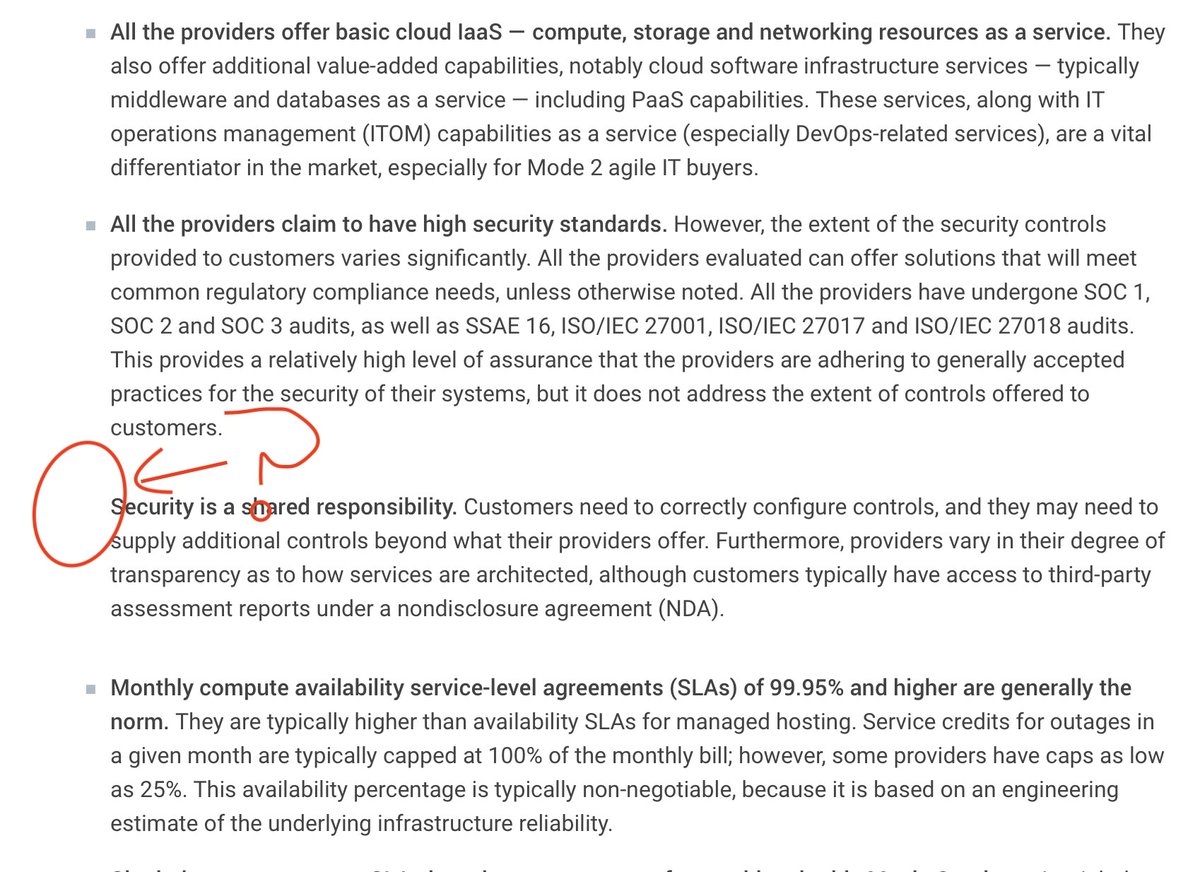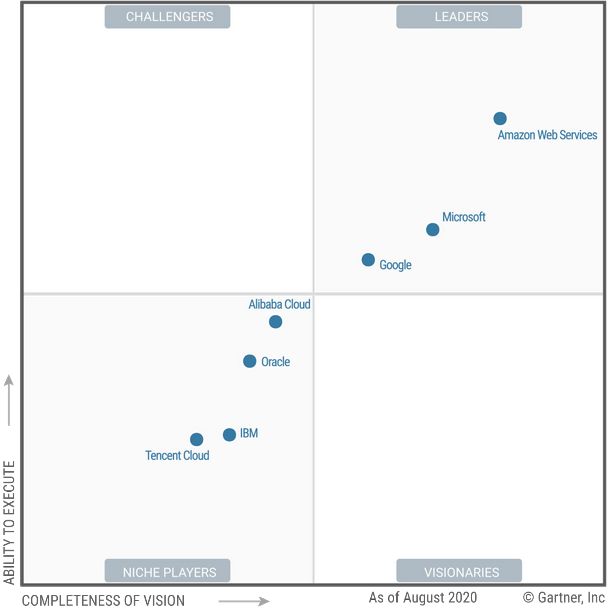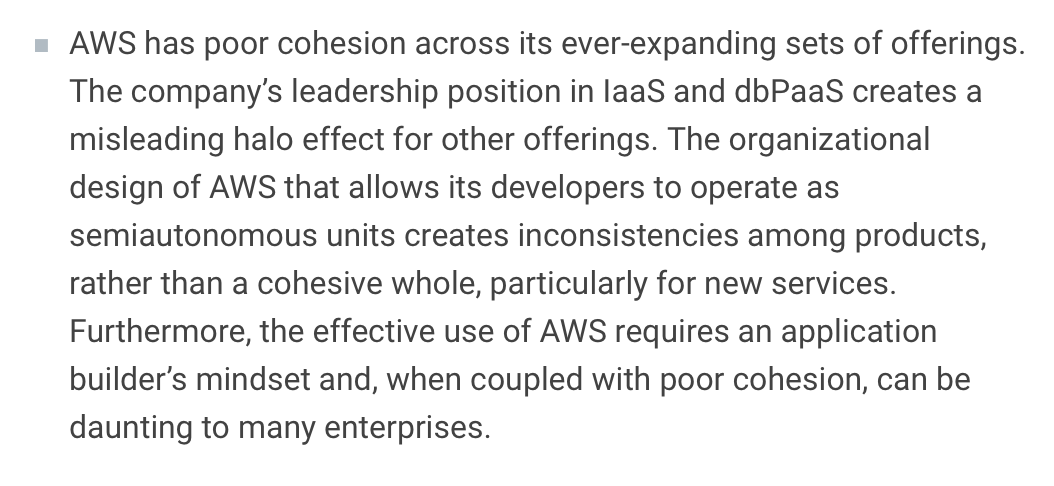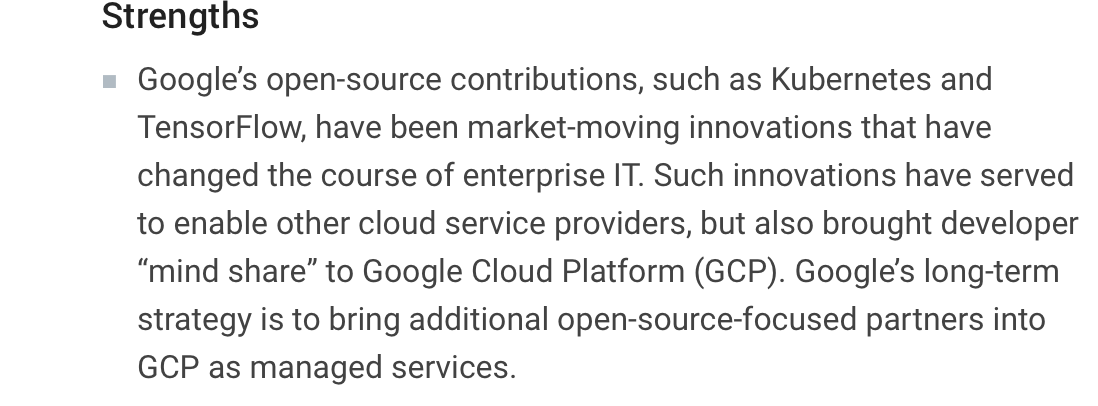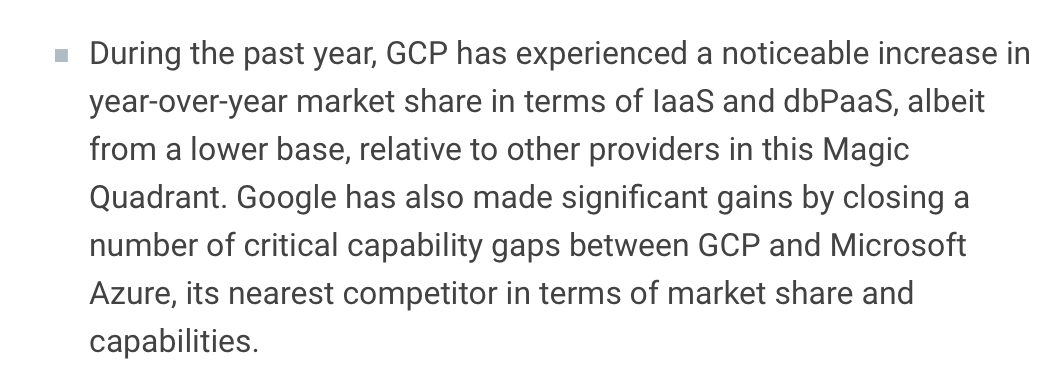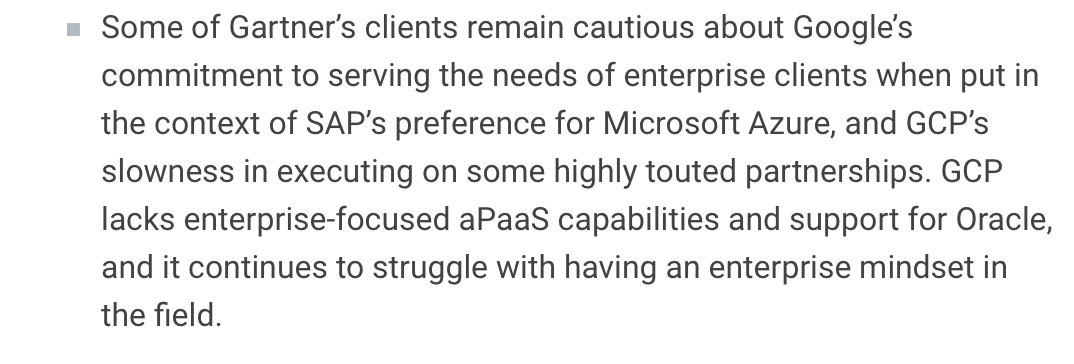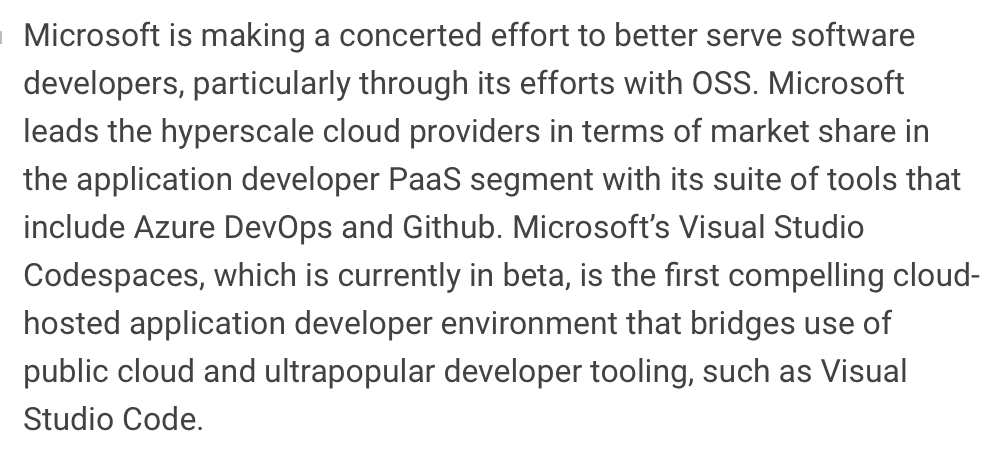And now, the moment every DevSecOpsQAnon has been waiting for: a teardown thread of the @gartner_inc Magic Quadrant for Cloud Infrastructure and Platform Services (because if you don't rename things frequently, you're not Gartner).
"These include application PaaS (aPaaS), functions as a service (FaaS), database PaaS (dbPaaS), application developer PaaS (adPaaS) and industrialized private cloud offerings that are often deployed in enterprise data centers."
'All the providers have public cloud IaaS and PaaS offerings.' This explains why @awscloud keeps half-assing higher-up-the-stack things that nobody wants like CodeCommit. GARTNER DEMANDS IT!
'All the providers target midmarket businesses and enterprises, as well as other companies that use technology at scale.' And tiny startups, and the healthcare vertical, and grammar school students, and dog rescues, and...
'All the providers offer basic cloud IaaS — compute, storage and networking resources as a service.' You say that, but @ibmcloud somehow made it into the inclusion criteria.
'All the providers claim to have high security standards.' Well yes, every company ever launched claims that. Did @gartner_inc have a word count they needed to hit or something?
'Security is a shared responsibility' much like getting a bullet in front of this item was. When it's a shared responsibility, it's no one's responsibility and thus it doesn't get done.
'All the providers will sign contracts with customers, can invoice and can consolidate bills from multiple accounts.'
And how. Negotiating these is a thing I have a lot of experience with; see https://www.duckbillgroup.com/services/aws-contract-negotiation/ for details.
And how. Negotiating these is a thing I have a lot of experience with; see https://www.duckbillgroup.com/services/aws-contract-negotiation/ for details.
(Here's a crappy GIF I made that shows the motion for the past three years, for comparison.)
Strengths and Cautions per provider, sorted alphabetically. That means we start with @alibaba_cloud. They're a "niche player" which is generally how @gartner_inc says "they're shitty, but also they pay us a lot of money so we have to couch it in more positive terms."
They're the marketshare leader in China. That's a double-edged sword as Gartner sees it. "Not much adoption or focus outside of China."
'Alibaba Cloud is a mere 8% of Alibaba Group’s total revenue, and the cloud business unit continues to operate at a single-digit financial loss.' They're still in the "losing money on Cloud" phase.
Next up is @awscloud. 'AWS has a future focus on attempting to own increasingly larger portions of the value chain that delivers cloud services to customers.' That's a fun way of saying "they are coming to eat you."
They also have 'a commanding lead' in basically everything.
They also have 'a commanding lead' in basically everything.
'AWS has the skills, resources and motivation to vertically integrate and deliver solutions to customers end to end.' A snider person than I might respond with "well then, why don't they?"
"So @awscloud pisses off the entire open source community, Amazon terrifies basically everyone, and they generally take without giving. STRONG RECOMMEND."
"It seems like @awscloud service teams don't speak to one another." YOU DON'T SAY, PROFESSOR?!
I disagree with @gartner_inc here: nobody believes that @awscloud reduces prices broadly.
I have never once been asked by a client to model an AWS price cut into the calculation of their appropriate spend commitment.
I have never once been asked by a client to model an AWS price cut into the calculation of their appropriate spend commitment.
Next up we have @gcpcloud / @googlecloud. (They have two Twitter accounts that compete with one another until one or both is deprecated.)
I didn't know that @gcpcloud had a future telco focus. Or frankly, much in the way of focus past "THERE'S MONEY OVER HERE MAYBE" to begin with if I'm being direct.
I take the more cynical approach of "Kubernetes was originally intended to get customers with legacy workloads that broke in GCP to write software more like Google would write software."
@gcpcloud badly underestimated how terribly the rest of us can write software.
@gcpcloud badly underestimated how terribly the rest of us can write software.
Was @gartner_inc scrambling to find a strength? Of *COURSE* it's easier to demonstrate 50% growth of a smaller number than a bigger number!
Cautions!
I don't know as " @gcpcloud doesn't support Oracle" would have made my top ten list, but then again I'm not @gartner_inc.
I don't know as " @gcpcloud doesn't support Oracle" would have made my top ten list, but then again I'm not @gartner_inc.
Imagine this for a second. "Google doesn't like @gcpcloud because while it makes money and a profit, it's not AS profitable as our ad business, so shut it down" isn't a completely bonkers statement! It could feasibly happen! Because the market is NUTS!
There's a win buried in here. "Devastating customer impact" beats "and nobody much noticed or cared" I suppose.
And this hints that G-Suite and YouTube might run atop @gcpcloud! Or they have issues with failure domains. Hmm...
And this hints that G-Suite and YouTube might run atop @gcpcloud! Or they have issues with failure domains. Hmm...
Next up we see @gartner_inc struggling to reconcile "Gartner isn't Pay For Play" with their inclusion of @ibmcloud here. IBM Cloud has many customers but no happy ones; it's a Niche Player.
Who is @IBMcloud for? Let me turn this around on you: who reads this paragraph and says "THAT'S MY COMPANY!"
The number one @ibmcloud strength: 'It supports Power systems.' If you don't know what that is, don't feel bad. It's IBM's custom processor architecture that has about the level of adoption you'd expect for something more readers than not have never heard of.
Strength 2: @ibmcloud partners super well with @IBMServices so you don't have to deal with third parties to... I'm sorry, to do what again? I had some trouble deciphering the nonsense.
Strength 3: 'IBM has transitioned to messaging around hybrid and multicloud computing.'
So... marketing? Their third strength is proposing dumb things with better marketing than in years past? Is this thing on?
So... marketing? Their third strength is proposing dumb things with better marketing than in years past? Is this thing on?
Cautions! ' @IBMcloud remains a complex platform resulting from legacy offerings and uneven product development gains... Notably, IBM was 10 years late to market with cloud software-defined networking (SDN) capabilities.'
"10 years late" is IBM's "5 years early" apparently.
"10 years late" is IBM's "5 years early" apparently.
And here's @gartner_inc burying the lede, which is also my point about why multi-cloud is bullshit.
And the third weakness, ' @IBMcloud has negligible worldwide market share in the application PaaS category.'
That's kind. "Global outages with zero customer communication for hours, then a bullshit RCE" would have been mine.
That's kind. "Global outages with zero customer communication for hours, then a bullshit RCE" would have been mine.
And now I have a phone call, so I'll pause. When I return, @azure is up next.
And we return to the @gartner_inc MQ Smackdown with their @Azure section.
I don't know that I'd pitch it for "all use cases." It's pretty clear that after @gcpcloud and @awscloud experience, Azure is Not Like Other Clouds(tm).
I don't know that I'd pitch it for "all use cases." It's pretty clear that after @gcpcloud and @awscloud experience, Azure is Not Like Other Clouds(tm).
" @azure offers a complete end-to-end set of solutions that if you're not an existing big-e Enterprise shop using lots of Microsoft you're going to freaking hate."
But they're trying to fix that! Credit where due, the @azure OSS involvement is no joke, and I'm eagerly awaiting the Codespaces GA.
"So @azure regions are basically a rickety trailer full of server racks parked in a @Walmart parking lot" is what @gartner_inc is really saying here.
"Go home, cloud's full" was what some customers were told late last year before COVID19 hit; this proved distressing.
"Go home, cloud's full" was what some customers were told late last year before COVID19 hit; this proved distressing.
'Microsoft does not provide any form of guaranteed capacity to customers; even prepaid agreements and reserved instances are not capacity guarantees.' Yikes. What's the goddamned point of RIs then?!
'A small number of customers were unable to provision reserved instances or capacity for which they had already paid' is not the sort of sentence you want to see @gartner_inc using in a report, as many prospective @azure customers will read that and go:
'Microsoft’s Unified Support can be very expensive,' almost escaped my attention until I remembered what @gartner_inc seats cost. Worse, "Gartner clients continue to report concerns with the quality of these experiences."
Next up, @OracleCloud! Also a niche player. It's worth pointing out that old Oracle Cloud was garbage; New Oracle Cloud ("Gen 2" / "Gentoo") is less garbage by a lot.
@gartner_inc seems cautiously optimistic in a forward-looking manner.
@gartner_inc seems cautiously optimistic in a forward-looking manner.
Notably, "not just for @Oracle application workloads" is going to ultimately determine @oraclecloud's success or failure.
"The only entrant with a presence in Saudi Arabia" is "yikes" fodder, but it's also a demonstration of how serious they are about improving their global footprint.
1. How is Microsoft not also "of its lineage?" The two companies aren't that far apart.
2. Simultaneous global feature rollout is a mixed bag. I have clients in @awscloud us-east-2 that keep getting bitten by canary rollouts causing issues that catch @awssupport by surprise.
2. Simultaneous global feature rollout is a mixed bag. I have clients in @awscloud us-east-2 that keep getting bitten by canary rollouts causing issues that catch @awssupport by surprise.
Strength 3 is very much an @oraclecloud strength. "We roll out a full region with all services on your premises" is a heck of a differentiator.
Cautions!
1: "Most folks interested in the OCI partnership with @azure are intent on not using @oraclecloud due both to an unfounded perception of OCI's viability as well as negative experiences with @oracle in general."
They've got serious brand rehabilitation to do.
1: "Most folks interested in the OCI partnership with @azure are intent on not using @oraclecloud due both to an unfounded perception of OCI's viability as well as negative experiences with @oracle in general."
They've got serious brand rehabilitation to do.
Caution 2: @oraclecloud customers are native to the land of the Old and Busted, failing to adopt much of OCI's New Hotness.
Caution 3: "Oracle has low market share in the public cloud database segment." GEE ONE WONDERS WHY.
Lastly, I don't give a dime but @tencentcloud does. They're the shittiest--sorry, nicheiest @gartner_inc entrant.
Strengths include "strong synergies," "investing heavily and with a presence in Russia, and I swear I'm not making this up:
Strengths include "strong synergies," "investing heavily and with a presence in Russia, and I swear I'm not making this up:
Cautions include " @tencentcloud who?", "international companies except for gaming ignore them," and "not as innovative, preferring to fast follow instead."
Now, "Inclusion and Exclusion criteria."
Contrary to popular belief, this isn't a @gartner_inc price list. Market participation, traction, and whatever the hell 'business + technical capabilities relevant to Gartner clients' means.
Contrary to popular belief, this isn't a @gartner_inc price list. Market participation, traction, and whatever the hell 'business + technical capabilities relevant to Gartner clients' means.
Now, Evaluation Criteria.
"Ability to Execute" is the first one. Ugh. Has @gartner_inc just completely ignored @killedbygoogle? @gcpcloud is worlds ahead in executing products before their time!
"Ability to Execute" is the first one. Ugh. Has @gartner_inc just completely ignored @killedbygoogle? @gcpcloud is worlds ahead in executing products before their time!
Okay, this should have blown @ibmcloud out of the water entirely.
Fortunately for @awscloud, they're not graded on their ability to convey marketing messages *effectively*.
Fortunately for @awscloud, they're not graded on their ability to convey marketing messages *effectively*.
'The clarity and accuracy of their marketing messages, compared with their actual service offerings' is pretty damning.
I still don't know what an Anthos is, and I'm more than a bit scared of what an IoT SitePorker might be.
I still don't know what an Anthos is, and I'm more than a bit scared of what an IoT SitePorker might be.
'Providers were evaluated on their ability to articulate their position in the market and their competitive differentiation, and to communicate these messages clearly and consistently'
@awscloud: "If you don't use us you're a fukkin' idiot" https://aws.amazon.com/blogs/publicsector/jedi-why-we-will-continue-protest-politically-corrupted-contract-award/
@awscloud: "If you don't use us you're a fukkin' idiot" https://aws.amazon.com/blogs/publicsector/jedi-why-we-will-continue-protest-politically-corrupted-contract-award/
(I still can't get over the fact that @awscloud couldn't bask in their @gartner_inc MQ victory for a full half a day before posting that incoherent rant.)
And now, my thoughts / takeaways.
It's fun to dunk on @gartner_inc, but there's actual value here in understanding how big companies approach these things. *YOU* may not care about their reports but I promise you, every vendor named sure as hell does.
It's fun to dunk on @gartner_inc, but there's actual value here in understanding how big companies approach these things. *YOU* may not care about their reports but I promise you, every vendor named sure as hell does.
I don't think you're wrong to pick @gcpcloud / @awscloud for most workloads. @Azure would require some careful boundary definition and thought. @OracleCloud has to prove itself in the non-Oracle application space, but watch it with interest.
I frankly don't pay attention to @alibaba_cloud or @tencentcloud. And @IBMCloud is dead to me until and unless they let their staff fix the clearly-articulated problems with the offering.
What I think does get missed by many is that @gartner_inc is a great source of opinion, but only you can make informed decisions for your org.

 Read on Twitter
Read on Twitter